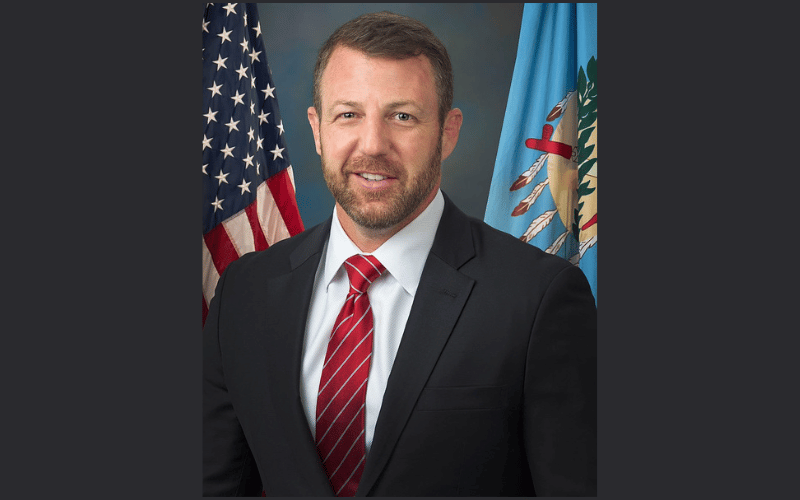WASHINGTON, D.C. –The government shutdown reached 35 days on Tuesday, matching the length of the 2018-2019 shutdown, the longest in U.S. history. And while there is no officially announced movement toward a resolution, many Senators, including Oklahoma’s Markwayne Mullin, say it is increasingly likely that enough Democrats will join Republicans in voting for their stopgap funding measure to reopen the government by the end of the week.
Sen. Mullin (R-OK) spoke with Griffin Media Washington Bureau Chief Alex Cameron about the situation late Tuesday morning:
CAMERON: You remain convinced, based on your conversations, that the shutdown will end this week?
MULLIN: Well, the Democrats had an agreement… or (Minority Leader Chuck) Schumer (D-NY) had an agreement with Dick Durbin (D-IL), according to my close friends over there, that if they would hold off until after the election, then he would take the handcuffs off, essentially. Because evidently Dick Durbin was very persistent in their meeting, that he wanted to vote—enough was enough and…we’ve always said this was about politics, we’ve always said that; even the Democrats have said it’s their only leverage point. The leverage point was to get past the election, you know, you got Virginia’s election today, you got New Jersey’s election today, you got the mayoral election in New York City, and they were afraid if they open the government before that, the base would stay home. So, the election is gonna be over tonight, (and) tomorrow they’re either gonna try and take a victory lap, try to spin it about ‘being Trump‘s fault since he’s not willing to take care of the people and they’re going to take the high road’—whatever it is. Now, we’ve got to make a few changes to it (the funding bill) because November 21 obviously isn’t gonna work now, so we’re gonna have to change the date to it. And there may be an ability to put three appropriations bills on it—one of them being defense—but we have to have unanimous consent to do that. We’re trying to work through that process, so I think we vote probably Thursday; it might push ‘til Friday, but either way, we’re voting. I know the House had a conference today — you know, a phone conference — just kind of giving a heads up that there’s a good possibility they’re going to be coming back within a week.
CAMERON: Speaker Johnson (R-LA) apparently made it clear (at his news conference this morning) that the House won’t support a new CR unless the new deadline is in January — they don’t want to potentially have to vote for a big omnibus spending bill just before Christmas.
MULLIN: There’s a group that wants December 19th, another wants it in January. The House has been very adamant about they don’t want to be pushed up against another holiday. We’ve just gotta figure out which date we can get the votes for.
CAMERON: There’s been some reporting that part of the deal with Democrats is agreeing to hold a vote on extending Affordable Care Act subsidies by a date certain. Is that agreement in this?
MULLIN: No, we’re not—we’ve made it very clear. We’ll give them a vote, but we’re not giving them a date certain. We have no problem with giving them a vote on it, but that’s not part of the negotiations… We have said that from day one.
CAMERON: President Trump has been urging you guys to use the nuclear option to do away with the filibuster (so you could not have to worry about getting Democratic support and pass the CR with a simple majority), but Leader (John) Thune (R-SD) says he opposes that — where do you stand?
MULLIN: I think we’ve gotta be very careful there. The knee-jerk reaction sometimes can have short-term gains but long-term consequences. Keep in mind, the filibuster protected us from them (Democrats) packing the courts just a few years ago when Biden was in the White House, (Nancy) Pelosi was in charge of the House, and Schumer was the leader of the Senate. It kept them from making DC a state, it kept them from federalizing elections, kept them from eliminating fossil fuels and making us all drive electric vehicles. So the filibuster has worked in our favor, and we’d be naïve to think that we’ll never be back in the minority. So, I get that there needs to be some special discussions about the filibuster, in the case we do go into (another) shutdown. I don’t think the filibuster is ever supposed to be used for political purposes; it was a way for us to have policy differences. What Chuck Schumer has done here is he’s blowing up the whole system, from filibustering every one of President Trump’s noms, to now using the filibuster to keep from operating the government because of his political fears. So maybe there’s a limited conversation to take place with the filibuster — under special circumstances, if we were to enter into another shutdown, after certain number of days—let’s just say 10 days—and after 10 days that we can go ahead and open up the essential part of the government and pay those employees. That might be a discussion of some sort, but just to eliminate the filibuster altogether — it’s protected us in the minority, and we need to think about that before we pull that nuclear option.


















